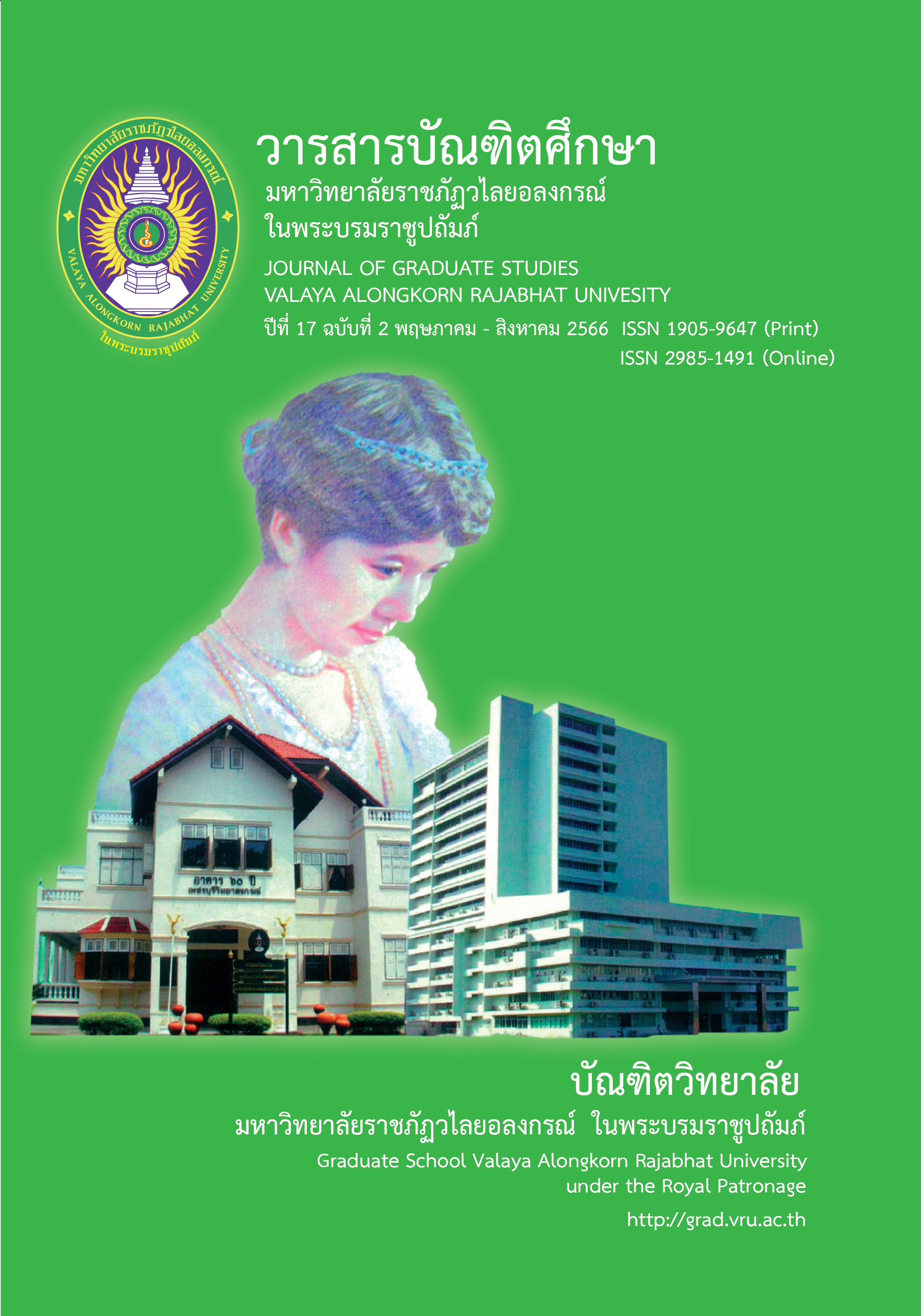การพัฒนาหลักสูตรฝึกอบรมฐานสมรรถนะวิชาชีพครู เพื่อพัฒนาผู้เรียนตามแนวคิดสมองเป็นฐาน สำหรับครู ในสังกัดสำนักงานคณะกรรมการการศึกษาขั้นพื้นฐาน จังหวัดสกลนคร
Main Article Content
บทคัดย่อ
การวิจัยนี้มีวัตถุประสงค์เพื่อ 1) ศึกษาสภาพและความต้องการในการพัฒนาหลักสูตรฝึกอบรมฐานสมรรถนะวิชาชีพครู 2) พัฒนาหลักสูตรฝึกอบรมฐานสมรรถนะวิชาชีพครู 3) พัฒนาความรู้ ความสามารถที่นำไปสู่การจัดการเรียนรู้ฐานสมรรถนะของครูผู้สอน และ 4) ศึกษาความพึงพอใจในการใช้หลักสูตรฝึกอบรมฐานสมรรถนะวิชาชีพครู การได้มาของกลุ่มตัวอย่างใช้ตารางกำหนดขนาดกลุ่มตัวอย่างของ Krejcie & Morgan กลุ่มตัวอย่างที่ใช้ ได้แก่ ครูผู้สอน ผู้บริหาร และนักเรียน ในสังกัดสำนักงานคณะกรรมการการศึกษาขั้นพื้นฐาน จังหวัดสกลนคร จำนวน 590 คน เครื่องมือที่ใช้ในการวิจัยคือแบบสอบถาม และกลุ่มเป้าหมายเข้าอบรมในหลักสูตร จำนวน 120 คน ได้แก่ ครูผู้สอนในระดับปฐมวัย จำนวน 40 คน ระดับประถมศึกษา จำนวน 40 คน และ ระดับมัธยมศึกษา จำนวน 40 คน เครื่องมือที่ใช้ในการวิจัยคือ หลักสูตรฝึกอบรมฐานสมรรถนะวิชาชีพครู และแบบสอบถามความพึงพอใจ สถิติที่ใช้ในการวิเคราะห์ข้อมูล คือ ร้อยละ ค่าเฉลี่ย และส่วนเบี่ยงเบนมาตรฐาน
ผลการวิจัยพบว่า 1) ผลการศึกษาสภาพและความต้องการของระดับการปฏิบัติตามสมรรถนะหลัก มีค่าเฉลี่ยเท่ากับ 4.42 อยู่ในระดับมาก ระดับการปฏิบัติตามสมรรถนะประจำสายงาน มีค่าเฉลี่ยเท่ากับ 4.54 อยู่ในระดับมากที่สุด ระดับการปฏิบัติตามสมรรถนะ มีค่าเฉลี่ยเท่ากับ 4.02 อยู่ในระดับมาก และระดับความต้องการตามสมรรถนะ มีค่าเฉลี่ยเท่ากับ 4.55 อยู่ในระดับมากที่สุด 2) ผลการศึกษาการพัฒนาหลักสูตรฝึกอบรมฐานสมรรถนะวิชาชีพครู เพื่อพัฒนาผู้เรียนตามแนวคิดสมองเป็นฐาน มีองค์ประกอบของหลักสูตร ดังนี้ (1) ความเป็นมาของหลักสูตร (2) หลักการของหลักสูตร (3) วัตถุประสงค์ของหลักสูตร (4) ผลที่คาดว่าจะได้รับ (5) โครงสร้างหลักสูตร (6) เนื้อหาสาระของหลักสูตร (7) ระยะเวลาที่ใช้ในการอบรม (8) วิธีการดำเนินการ (9) สื่อ/นวัตกรรมการเรียนรู้ (10) สถานที่ฝึกอบรม (11) การวัดและการประเมินผล (12) ตารางการฝึกอบรม และ (13) ภาคผนวก3) ผลการศึกษาพบว่าหลักสูตรมีคุณภาพและความเหมาะสมอยู่ในระดับมากที่สุด ( = 4.58, SD = 0.62) 4) ผลการศึกษาการพัฒนาความรู้ความสามารถที่นำไปสู่การจัดการเรียนรู้ฐานสมรรถนะของครูผู้สอนในแต่ละระดับ พบว่า (1) ครูผู้สอนระดับปฐมวัยที่มีสมรรถนะในระดับพัฒนาการสูงมาก มีจำนวน 33 คน คิดเป็นร้อยละ 82.50 (2) ครูผู้สอนระดับประถมศึกษาที่มีสมรรถนะในระดับพัฒนาการสูงมากมีจำนวน 28 คน คิดเป็นร้อยละ 70.00 และ (3) ครูผู้สอนระดับมัธยมศึกษาที่มีสมรรถนะในระดับพัฒนาการสูงมาก มีจำนวน 33 คน คิดเป็นร้อยละ 82.50 และผลการศึกษาความพึงพอใจในการใช้หลักสูตร ผลการศึกษาพบว่า (1) ครูผู้สอนระดับปฐมวัย มีความพึงพอใจอยู่ในระดับมากที่สุด (
= 4.56, SD = 0.50) (2) ครูผู้สอนระดับประถมศึกษา มีความพึงพอใจอยู่ในระดับมากที่สุด (
= 4.53, SD = 0.54) และ (3) ครูผู้สอนระดับมัธยมศึกษา มีความพึงพอใจอยู่ในระดับมากที่สุด (
= 4.51, SD = 0.49)
Article Details

อนุญาตภายใต้เงื่อนไข Creative Commons Attribution-NonCommercial-NoDerivatives 4.0 International License.
บทความทุกเรื่องได้รับการตรวจความถูกต้องทางวิชาการโดยผู้ทรงคุณวุฒิ ทรรศนะและข้อคิดเห็นในบทความ Journal of Global of Perspectives in Humanities and Social Sciences (J-GPHSS) มิใช่เป็นทรรศนะและความคิดของผู้จัดทำจึงมิใช่ความรับผิดชอบของบัณฑิตวิทยาลัย มหาวิทยาลัยราชภัฏวไลยอลงกรณ์ ในพระบรมราชูปถัมภ์ กองบรรณาธิการไม่สงวนสิทธิ์การคัดลอก แต่ให้อ้างอิงแหล่งที่มา
เอกสารอ้างอิง
Charinee, T. (2007). Kānphatthanā samatthaphāp kānčhatkān rīan kānsō̜n khō̜ng khrū prathom sưksā tām nǣokhit dakān sưksā phān botrīan [Development of elementary school teachers' instructional capacity through lesson study approach]. Degree of doctor of Philosophy Program in Curriculum and Instruction Department of Curriculum, Instruction, and Educational Technology Faculty of Education Chulalongkorn University.
Ministry of Education. (2008). laksūt kǣn koklāng kānsưksā naphư̄n thān Phō̜.Sō̜. sō̜ngphanhārō̜ihāsipʻet [The Basic Edducation Core Curriculum B.E.2551 (A.D.2008]. Bangkok: Agricultural Cooperative Community Printing House of Thailand Ltd.
Nithiwutthiphak, N., Phengsawat, W. & Koomkhinam, T. (2017). kānphatthanā laksūt kān fưk ʻoprom kānčhatkān rīanrū bǣp khrōng ngān khō̜ng khrū sō̜n phāsā ʻAngkrit radap prathom sưksā sangkat samnakngān khana kammakān kānsưksā naphư̄n thān [A Development of Training Curriculum on Project Work of Primary-Level English Teachers Under the Office of the Basic Education Commission]. Journal of Graduate Studies Valaya Alongkron Rajabhat University. 11(3), 37 -51.
Office of the National Economics and Social Development Council. (2007). phǣn phatthanā sētthakit læ sangkhom hǣng chāt chabap thī 10 [The National Economic and Social Development Plan 10]. Bangkok: Office of the Prime Minister.
Pianprasit, S. (2010). kānphatthanā laksūt fưk ʻoprom khrū phư̄a sāng laksūt fưk ʻoprom tœ̄m tem chō̜ngwāng samatthana laksūt rāiwichā chīp chāng yon [Development of a teacher training course to create a training course to fill the gap in the competency of the automotive technician course]. Master's thesis. King Mongkut’s University of Technology of North Bangkok.
Punyaratabandhu, S. (2013). rabīap withī wičhai thāng ratthaprasāsanasāt [Research Methodology in Political Science]. Bankok: sematham.
Taba, H. (1962). Curriculum development: Theory and practice. New York: Harcourt, Brace & world.
Tonmuangjai, A. (2013). khwāmsāmāt nai kānsư̄sān thāng witthayāsāt khō̜ng nakrīan chan prathomsưksā pī thī hā thī rīan dōi chai kitkamkān rīanrū bǣp chai samō̜ng pen thān [Scientific communication abilities of grade 5 students]. Master's thesis. Chiangmai University.


